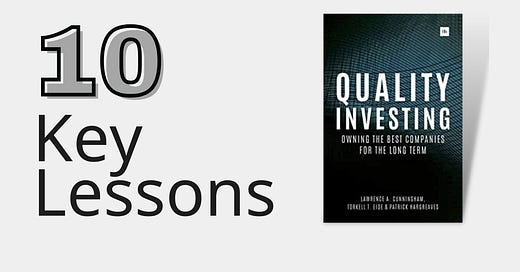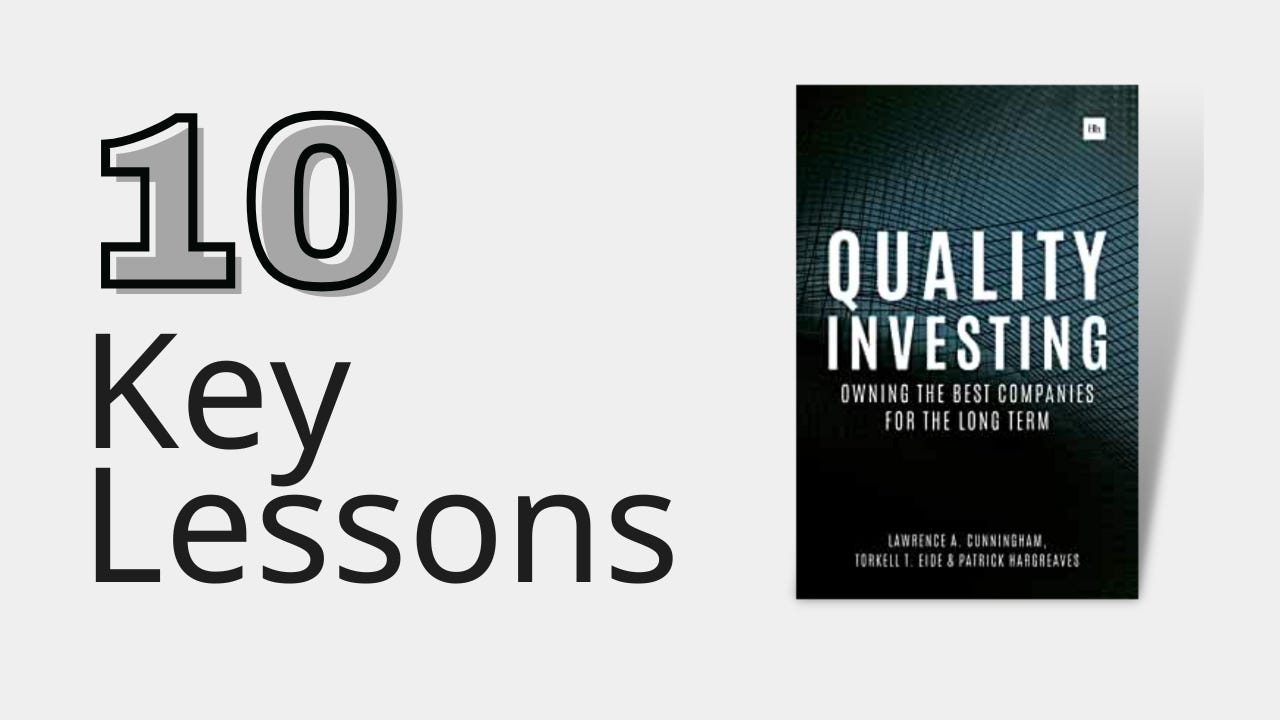10 Essential Lessons from "Quality Investing": A Guide to Long-Term Investment Success
In "Quality Investing: Owning the Best Companies for the Long Term," the authors, drawing from their extensive experience at AKO Capital, present a comprehensive framework for identifying and investing in high-quality businesses.
While the book offers many valuable insights, I've distilled what I consider to be the ten most crucial lessons that can help investors build a robust investment strategy. These lessons focus on key aspects such as corporate culture, business analysis, risk management, and market performance.
Corporate Culture and Leadership
1. The Power of Self-Perpetuating Culture
Cultures tend to self-perpetuate, so look for companies with a long-term focus. When analyzing a company's culture, it's important to look for a long-term focus that prioritizes value creation over short-term gains. Companies that have a strong culture that focuses on the long term tend to perform better in the stock market.
2. The Importance of Ethical Behavior
Companies that tolerate deviance may actually reward rule-bending behavior, so be aware of this when analyzing a company's culture. It's important to look for companies that have a culture of integrity and ethical behavior. Companies that tolerate unethical behavior or rule-bending may face legal and reputational risks that can negatively impact their stock price.
3. Family Ownership Advantage
Invest in companies with inter-generational family ownership, as they often prioritize long-term value creation. Companies that are owned and managed by families tend to have a long-term focus and prioritize value creation over short-term gains. These companies are less likely to engage in risky behavior that can negatively impact their stock price.
Business Analysis and Competition
4. Competitive Moat Assessment
Analyze what it would take for a newcomer to replicate a company's business and remove its competitive advantage. When investing in a company, it's important to analyze its competitive advantage and assess whether it can be easily replicated by newcomers. Companies with a strong competitive advantage tend to perform better in the stock market.
5. Industry Selection
Avoid investing in deeply cyclical industries, such as energy and mining, which are more prone to short-term thinking. Companies in cyclical industries tend to be more focused on short-term gains and may not prioritize long-term value creation. It's important to avoid investing in these industries and focus on companies that have a long-term focus.
Business Model and Risk Management
6. Revenue Stability
Look for companies whose profits are tied to customers' operating costs rather than capital expenditure, as this poses less risk of disruption during economic downturns. Companies whose profits are tied to customers' operating costs tend to be less affected by economic downturns and are more predictable in terms of revenue streams.
7. Proven Track Record
Be cautious of new, hot start-ups and instead focus on analyzing what is often in plain view. It's important to avoid investing in new, hot start-ups that may not have a proven track record of success. Instead, focus on analyzing established companies that have a history of success.
Market Performance and Valuation
8. Economic Resilience
Quality companies have historically fared much better than the market amid economic upheaval. Companies that prioritize long-term value creation tend to perform better in the stock market during periods of economic upheaval. It's important to focus on quality companies that have a long-term focus.
9. Control and Independence
Avoid investing in companies that depend significantly on factors outside their control, as these factors can significantly alter the competitive advantage or economics of the business. Companies that depend on factors outside their control, such as economic or political factors, may face significant risks that can negatively impact their stock price.
10. Valuation Considerations
Overpayment can be a risk, but quality companies often exceed earnings expectations over the long term. It's important to avoid overpaying for stocks, but quality companies often exceed earnings expectations over the long term. It's important to focus on quality companies that have a proven track record of success and prioritize long-term value creation.
Final Thoughts
By focusing on these key aspects - from corporate culture to business model resilience - investors can build a portfolio of high-quality companies that stand the test of time. Successful investing is not about finding the next hot stock, but rather about identifying and holding onto excellent businesses that compound value over years and decades.




